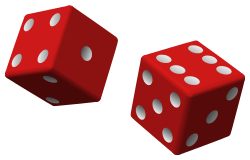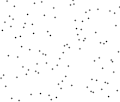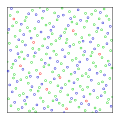Intuitively, an algorithmically random sequence (or random sequence) is a sequence of binary digits that appears random to any algorithm running on a (prefix-free...
33 KB (4,904 words) - 17:35, 14 July 2025
needed] Algorithmically random sequence Quasi-random sequence Random number generation Random sequence Random variable Random variate Random real Richard...
4 KB (386 words) - 05:32, 2 July 2025
Chaitin's constant (category Algorithmic information theory)
enumerated. A real number is random if the binary sequence representing the real number is an algorithmically random sequence. Calude, Hertling, Khoussainov...
18 KB (2,319 words) - 08:25, 6 July 2025
values of a low-discrepancy sequence are neither random nor pseudorandom, but such sequences share some properties of random variables and in certain applications...
26 KB (4,265 words) - 04:46, 14 June 2025
concept of a random sequence is essential in probability theory and statistics. The concept generally relies on the notion of a sequence of random variables...
9 KB (1,191 words) - 00:02, 21 August 2024
Pseudorandom number generator (redirect from Pseudo-random number generator)
random bit generator (DRBG), is an algorithm for generating a sequence of numbers whose properties approximate the properties of sequences of random numbers...
28 KB (3,559 words) - 14:58, 27 June 2025
determined, many properties of Ω are known; for example, it is an algorithmically random sequence and thus its binary digits are evenly distributed (in fact...
24 KB (2,789 words) - 16:41, 24 July 2025
optimization algorithm Odds algorithm (Bruss algorithm): Finds the optimal strategy to predict a last specific event in a random sequence event Random Search...
72 KB (7,951 words) - 17:13, 5 June 2025
In common usage, randomness is the apparent or actual lack of definite pattern or predictability in information. A random sequence of events, symbols...
34 KB (4,303 words) - 14:32, 26 June 2025
Random number generation is a process by which, often by means of a random number generator (RNG), a sequence of numbers or symbols is generated that...
36 KB (4,424 words) - 00:46, 16 July 2025
some algorithms are designed for sequential access, the highest-performing algorithms assume data is stored in a data structure which allows random access...
71 KB (6,618 words) - 07:09, 26 July 2025
Pseudorandomness (redirect from Pseudo-random sequence)
A pseudorandom sequence of numbers is one that appears to be statistically random, despite having been produced by a completely deterministic and repeatable...
7 KB (858 words) - 05:44, 9 January 2025
Fisher–Yates shuffle (redirect from Algorithm P)
next element in the shuffled sequence by randomly drawing an element from the list until no elements remain. The algorithm produces an unbiased permutation:...
42 KB (5,223 words) - 14:49, 20 July 2025
NIST Statistical Test Suite Randomness Statistical randomness Algorithmically random sequence Seven states of randomness Wald–Wolfowitz runs test Wolfram...
9 KB (1,173 words) - 09:35, 24 May 2025
theory of algorithmic randomness. He co-authored a paper demonstrating that a recursively enumerable real number is an algorithmically random sequence if and...
3 KB (263 words) - 20:49, 24 July 2025
In mathematics and computer science, an algorithm (/ˈælɡərɪðəm/ ) is a finite sequence of mathematically rigorous instructions, typically used to solve...
61 KB (7,016 words) - 18:37, 15 July 2025
approach to the definition of an algorithmically random sequence which is alternative to the concept of Martin-Löf randomness. Schnorr was a professor of mathematics...
4 KB (239 words) - 17:01, 7 July 2025
iterative algorithm. Prüfer sequences were first used by Heinz Prüfer to prove Cayley's formula in 1918. One can generate a labeled tree's Prüfer sequence by...
7 KB (983 words) - 19:02, 19 April 2025
is, appear to be random for many purposes. They were first introduced in 1960 and are an example of a quasi-random number sequence. They generalize the...
7 KB (738 words) - 05:49, 16 July 2025
difficult to predict and exhibits statistical behavior similar to a truly random sequence. PRBS generators are used in telecommunication, such as in analog-to-information...
8 KB (1,064 words) - 16:26, 5 February 2024
physics, the Metropolis–Hastings algorithm is a Markov chain Monte Carlo (MCMC) method for obtaining a sequence of random samples from a probability distribution...
30 KB (4,556 words) - 09:14, 9 March 2025
A random permutation is a sequence where any order of its items is equally likely at random, that is, it is a permutation-valued random variable of a...
7 KB (847 words) - 12:03, 7 April 2025
number generator (PRNG) that utilizes a deterministic algorithm and non-physical nondeterministic random bit generators that do not include hardware dedicated...
28 KB (3,305 words) - 08:22, 16 June 2025
theory, there exist several different notions of convergence of sequences of random variables, including convergence in probability, convergence in distribution...
41 KB (5,282 words) - 13:37, 7 July 2025
Kolmogorov complexity (redirect from Kolmogorov randomness)
randomness for infinite sequences from a finite alphabet. These algorithmically random sequences can be defined in three equivalent ways. One way uses an effective...
60 KB (7,896 words) - 07:35, 21 July 2025
Standard Template Library (redirect from Random-access iterator)
predicate. For example, algorithms like find_if take a unary predicate that operates on the elements of a sequence. Algorithms like sort, partial_sort...
24 KB (2,140 words) - 18:06, 7 June 2025
LZ77 and LZ78 (redirect from LZ77 (algorithm))
non random nature of a sequence. The algorithms represent the dictionary as an n-ary tree where n is the number of tokens used to form token sequences. Each...
18 KB (2,566 words) - 09:26, 9 January 2025
training set.: 587–588 The first algorithm for random decision forests was created in 1995 by Tin Kam Ho using the random subspace method, which, in Ho's...
46 KB (6,532 words) - 18:07, 27 June 2025
passing through the same sequence of states. Deterministic algorithms are by far the most studied and familiar kind of algorithm, as well as one of the...
9 KB (965 words) - 07:16, 3 June 2025
summation algorithm, also known as compensated summation, significantly reduces the numerical error in the total obtained by adding a sequence of finite-precision...
27 KB (3,531 words) - 10:41, 9 July 2025










